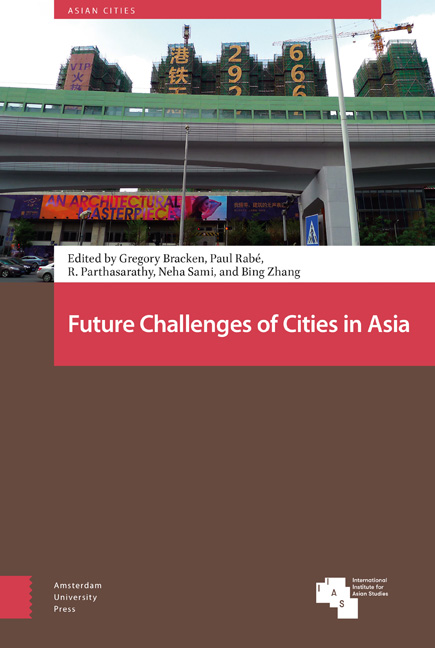Book contents
- Frontmatter
- About the Three UKNA Volumes
- Contents
- List of Figures and Tables
- 1 Future Challenges of Cities in Asia: An Introduction
- 2 Human Agency in the Asian City
- 3 Toward Inclusive, Vital and Livable City Scenarios: The Transformation of Urban Villages in Shenzhen
- 4 Cultural Dilemma in Beijing's Urban Regeneration: From Liulichang Cultural Street to Qianmen Street and Yangmeizhu Oblique Street
- 5 Housing as Heritage: The Great Urban Dilemma of the Global City of Shanghai
- 6 Not an Act of God: Lessons from a Disaster in the Settlements Planning of a River City
- 7 The Political Ecology of Climate Injustice in Bangkok
- 8 Assessing Flood-Related Vulnerability of the Urban Poor
- 9 The Ecological Future of Cities: Evaluating the Role of Green Infrastructure in Promoting Sustainability/Resilience in India
- 10 Hong Kong's “Rail-plus-Property” Development: A Model for Financing Public Transportation in Developing Cities in Southeast Asia?
- 11 Large Infrastructure Projects: The Emergence of Corridors in Asia
- Index
- Publications / Asian Cities
4 - Cultural Dilemma in Beijing's Urban Regeneration: From Liulichang Cultural Street to Qianmen Street and Yangmeizhu Oblique Street
Published online by Cambridge University Press: 21 November 2020
- Frontmatter
- About the Three UKNA Volumes
- Contents
- List of Figures and Tables
- 1 Future Challenges of Cities in Asia: An Introduction
- 2 Human Agency in the Asian City
- 3 Toward Inclusive, Vital and Livable City Scenarios: The Transformation of Urban Villages in Shenzhen
- 4 Cultural Dilemma in Beijing's Urban Regeneration: From Liulichang Cultural Street to Qianmen Street and Yangmeizhu Oblique Street
- 5 Housing as Heritage: The Great Urban Dilemma of the Global City of Shanghai
- 6 Not an Act of God: Lessons from a Disaster in the Settlements Planning of a River City
- 7 The Political Ecology of Climate Injustice in Bangkok
- 8 Assessing Flood-Related Vulnerability of the Urban Poor
- 9 The Ecological Future of Cities: Evaluating the Role of Green Infrastructure in Promoting Sustainability/Resilience in India
- 10 Hong Kong's “Rail-plus-Property” Development: A Model for Financing Public Transportation in Developing Cities in Southeast Asia?
- 11 Large Infrastructure Projects: The Emergence of Corridors in Asia
- Index
- Publications / Asian Cities
Summary
Abstract
This chapter reviews the process of urban regeneration in Beijing and presents three cases reflecting the old city's cultural strategy in different development phases. These cases illustrate the most representative dilemmas in current Chinese urban regeneration. At which point do government and the market achieve balance? Could cultural strategies and economic goals benefit from each other? How to combine the objects of physical space revival and protection of social ecology? How to transform short-term stimulus into a long-term mechanism? These challenges are not unique to China, but universal in other Asian cities. In the new round of urban regeneration, it is important to seek a self-updating mechanism that could maintain social justice, cultural continuity, and economic sustainability.
Keywords: Beijing, urban regeneration, culture strategy, historic preservation, development pattern
Introduction
In the tide of global urbanization, Asia has become the region with the most rapid urban population growth and largest number of big cities in the world. In the cities of Asia, rapid urbanization and population growth has brought many ancient cities new vitality, but at the same time presents a great challenge to the original physical environment and historical culture of these cities. Accompanied by problems arising from economic growth and deep-level urbanization, the upgrading of existing urban space instead of large-scale expansion is playing an increasingly important role. Meanwhile, the significant roles of culture and the arts in urban development have begun to emerge and the way to solve old cities’ economic problems has been integrated with culture and the arts. Culture-led urban regeneration is gradually becoming a new pattern in the regeneration of old city centers in order to improve the urban setting, promote a new urban economy, and help combat economic recession in older cities.
In China, especially in the historic and cultural cities, cultural industries are always accompanied by heritage conservation. Whether it is a historical area of cultural value or the modern industrial heritage left in the process of industrial transformation, as reactivated and reused by the emerging cultural creative industry, it is an important means to prevent recession. Cities like Beijing have experienced dramatic spatial changes during the rapid development that has happened since the 1980s.
- Type
- Chapter
- Information
- Future Challenges of Cities in Asia , pp. 65 - 98Publisher: Amsterdam University PressPrint publication year: 2019



